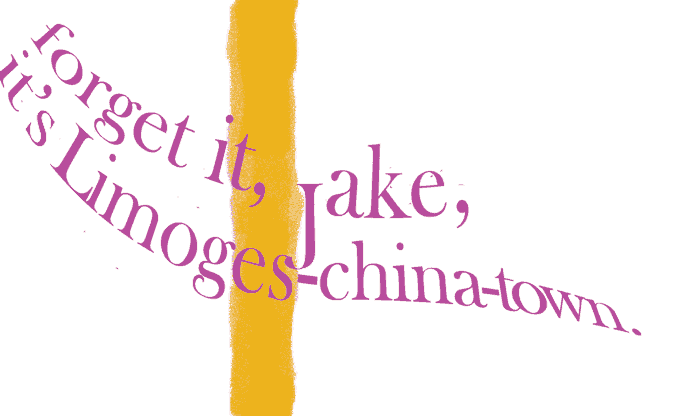A new boss is like a dog new to the neighborhood: he’s got to piss against each lamppost just to show he owns it. So, too, Dan Brodsky, the new Chair of the Board of Trustees at the Metropolitan Museum of Art, New York. Brodsky doesn’t take over ‘till September but he’s been pushing his weight around on the Met's Finance and Buildings Committee for a while, now. Last week the museum announced it was raising its "suggested" price of admission from $20.00 to $25.00
Finance and Buildings: forgive the redundancy. Brodsky’s a real-estate developer, as are the chairs of New York's Guggenheim and the Museum of Modern Art: it's Finance in the driver's seat. By my reckoning that leaves two major cultural institutions still run as cultural institutions, not merely for the benefit of Finance and the construction industry: Carnegie Hall, and the future New York City Opera.
Not to say that MoMA, the Met and all the others aren't run as educational institutions: their educational mission is to educate us un-business folks about the supremacy of moneyed interests. Higher admission prices at the Met play the same role as those articles in the New York Times about the modest three-star restaurant or that little pied-a-terre for sale in Helsinki: if you can't afford it you don't belong.

Meanwhile, a majority of the foreign tourists waiting to buy their tickets at the Met have never heard that admission's voluntary, will never be told (the signs are in English, only), will be uncertain as to how voluntary admissions are, and perhaps, who knows, won't like it when they find out. Any business that ran this kind of scam in New York City would be closed down; but as Inspector Rebus knows, it's not the underworld you have to watch out for, it's the overworld.
Besides: since when has balancing the books been a primary goal of Capital, except around election time? The point behind this kind of scam is to define the worth of Capital (exchange-value) versus that other cultural capital known as museum-going, or, say, a college education: symbolic capital or use-value. As my friend Jean-Michel Tobelem points out, the higher fee will now inspire museums all over France to claim they're just a business after all, and raising prices must be a good idea if the Americans are doing it. French neo-liberals call this kind of thing L'économie de l'immatériel, which isn't supposed to translate as "Immaterial Economics," but should. Whether the admission hike's a good idea for the Met itself, either from the cultural or economic point of view, is uh, immaterial: the point is to establish the superiority of the trustees' idea of an economy over all others. Max Weber speaks somewhere of the need for "substantive economic rationality," meaning that economic decisions that appear to have a rationale (like raising admissions prices at the Met) should actually have a purpose, over and beyond the self-explanatory, "formal" one that prices rise because that's what economists say they're supposed to do. Fuggedaboudit, Max. Why does the Invisible Hand of the Market lick its own balls? Because it can.
Except, the Invisible Hand gets plenty of help. Four blocks from the Met, the wreckers are tearing down the building that once housed the Hunter College Graduate School of Social Work, to be replaced by luxury condos built by Big Bucks Brodsky. The School has been "relocated" to one of the seedier parts of Harlem, with the loving, help of Jennifer Raab, President of Hunter College, a real-estate attorney with no previous academic credentials; with the loving, licking help of the City University's Board of Trustees, who've never had a doubt that education has its uses - not for students mind you, just for Business.
Now there's some evidence that the new Harlem digs are not what was promised in exchange: that the new facilities are shoddy, smaller, and insufficient for their purposes; that the faculty were lied to and the original plans were changed so Bigbucks could walk away with a couple million more and Jenny Raab could retire to a nice cushy job somewhere, soon. That's the kind of swindle that happens every day in New York City, at the Met, the University, or in the creation or preservation of green spaces. The swindle happens when someone like Dan Brodsky, or (something like the New York Times) is set up as the unchallenged arbiter of the balance of use-value against exchange-value, be it the value of museum-going against the value of museum admissions, or of a college education against the value of hard, cold cash from luxury condos - or for that matter, the value of Picasso or Matisse. Brodsky's planning to pull the same stunt with another piece of real estate, the Whitney Museum a few blocks South, which is scheduled to be turned over to the Met - at which point there'll be a few more minorities driven off the streets of the Upper East Side. After all it's not really racism if di Shvartze are excluded from museums, according to David Carrier, the art critic and philosopher. And it's not racism either if they're excluded from a college education: it's that Great Big Invisible Hand, you see, and never mind that the original intent behind the original "suggested price" idea at the Met was to keep down folks that needed a bit of reminding that they didn't run the show, much as the incessant tuition hikes at the City University of New York are meant to do.
In a 1929 lecture to a group of German entrepreneurs, the economist Joseph Schumpeter argued that those who belonged to the "leading stratum of economic life" should enforce the belief, the Glaube (the superstition, really) that all their greedy grubbing was for the public good, and to enforce this would require social leadership - like getting on the Board of the Metropolitan Museum of Art, for instance, or running a major daily like the New York Times. Sure, but what if the lowly proles have other ideas? What, for instance, if they, the lowly proles, feel they, too, should have a say in what the common good should be, what Art should be, for whom? As New York's Commissioner for Cultural Affairs put it, the purpose of museums is to create more jobs for parking-lot attendants - or is it to make sure there are more parking-lot attendants and fewer educated people? And is that the purpose, also, of the City University's Board of Trustees?
WOID XIX-50.
Driving Miss Crazy.
